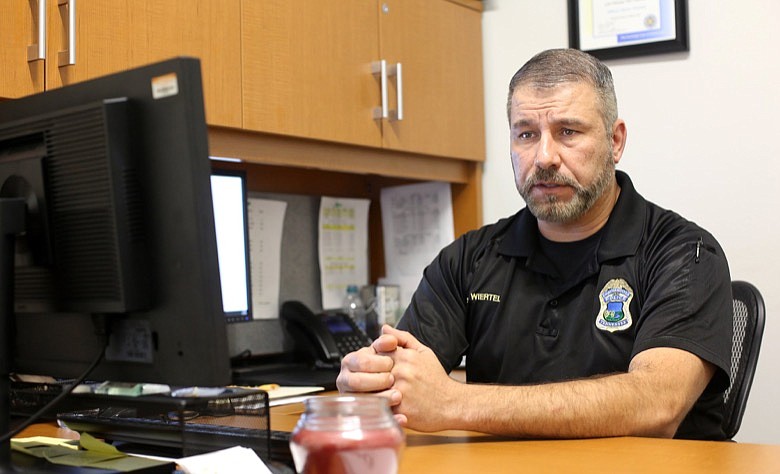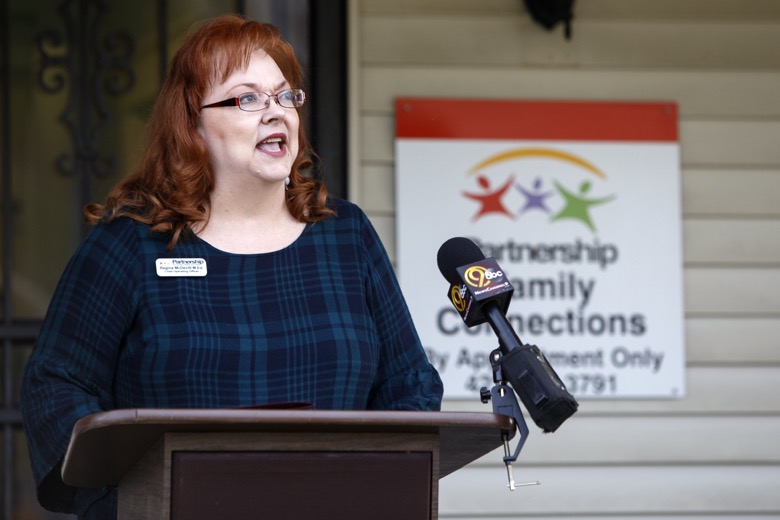The number of people killed in domestic violence incidents in Chattanooga doubled last year.
Since 2015, there had been no more than three domestic violence killings each year. That is, except for 2019.
Six people, including a 4-week-old, were killed in domestic violence incidents last year.
The first homicide of 2019 was the killing of Taja Whiteside. She was strangled by her boyfriend, 31-year-old Kameron Leslie, on Jan. 11, according to police. He is awaiting trial in that case.
Just months before, Leslie had been arrested for allegedly punching Whiteside in the face and then throwing a cement block through the window of her vehicle. Those criminal charges were later dropped because authorities couldn't locate Whiteside to appear in court that day, the Citizen Tribune of Greeneville, Tennessee, reported. Prosecutors often dismiss domestic violence charges when victims don't appear in court.
Two months later, 4-week-old Olivia Dunton was killed on March 4 after her father, 26-year-old Ivan Dunton, shook her because she wouldn't stop crying, he told police. Ivan Dunton had previously pleaded guilty in two separate domestic assault cases, including an attack against a pregnant woman, records show. He also is awaiting trial.
Across the state, domestic violence incidents have decreased between 2016 and 2018, according to the Tennessee Bureau of Investigation. But the number of domestic violence-related homicides has increased after a dip in 2017.
Last year's statewide report is not yet available.
INVESTIGATION, PROSECUTION
Domestic violence-related cases often can be difficult to investigate and prosecute, according to experts. That's because of several factors, including laws, rules of evidence or a lack of evidence and victim willingness to speak to police or testify in court.
On the front end, there's been a shift in how victims are treated over the years, said Special Victims Unit Sgt. Steve Wiertel. There's more training on how to respond to situations with the understanding of how trauma affects a victim.
"A lot of [victims] can be scared, confused. They don't understand the process, which can add another level of stress to their situations," Wiertel said. "Being able to establish trust between ourselves and the victim is very important."
The first part is just believing, he said. Believe first and then corroborate.
"We want to capture their story the first time the correct way, where we don't have to keep re-interviewing them over and over again," he said. "Because, yes, that could re-traumatize them."
Ultimately, though, it's the district attorney's decision to move forward with a case. And that has its own set of obstacles.
Rules of evidence sometimes limit what prosecutors can bring forward at trial. Evidence of "prior bad acts," is often barred, which takes the incident out of the context of the broader abusive relationship.
Another obstacle is that it is often a case of one person's testimony against another's, and sometimes victims back out.
Victim witness coordinators and other advocates work to build trust with victims and walk them through the court process. But they can't force victims to testify, and sometimes victims decide it's just not worth it. And that's understandable, 11th Judicial District Attorney General Neal Pinkston said.
"They don't want to come into court and reveal to all these people that they don't know that there are these large issues in whatever relationship they're in. I mean, who would want to do that?" he said.
That leaves prosecutors having to rely on other evidence: eyewitnesses, police testimony, video.
"Victimless prosecutions are very difficult, but I think and hope it's something we're going to see more of," said Sherri Bradford, chief victim witness coordinator for the DA's office.
But even so, sometimes all there is is just the officer's testimony. That's often enough to establish probable cause, but it's not always enough to establish guilt beyond a reasonable doubt, Executive Assistant District Attorney Cameron Williams said.
"Probable cause gets us to the grand jury and beyond indictment, but not a jury trial," Pinkston said. "And that's understandable - jurors, they need evidence to convict people."
With that high of a bar, "A lot of times, the victims may feel as if the system failed them," Wiertel said.
"And that's where we have to kind of rely on victim advocates," he said.
THE ADVOCATES
When the facts of the case aren't enough to support a conviction or when the victims decide to not go to police or through the court system, victim advocates still offer help and other options, including counseling, shelter, safety planning, supervised visitation or custody exchanges.
"Our advocates are there to support them," said Regina McDevitt, chief operations officer for the Partnership for Families, Children and Adults. "We do emotional support right off the bat."
"Sometimes it just creeps up on you," she said. "You're in a relationship and this is a person you love. And suddenly, you know, there's this emotional stuff happening. It increases in frequency and intensity over time, so an unhealthy relationship can very easily turn into an abusive relationship and you don't even recognize that that's where it's headed."
Need help?
If you are suffering any form of intimate partner abuse, you can call the domestic violence and sexual assault crisis hotline at 423-755-2700 that is available 24/7. All services — for both men and women — are free and confidential.
To help with that, officers have been conducting what are called "lethality assessments" at the scenes of domestic violence calls. It involves a questionnaire designed to provide an accurate picture of how dangerous the victim's domestic situation is. Some victims are prompted to call a domestic violence hotline. Other times, case workers follow up with them and walk them through their options.
And it's working. The Lethality Assessment Program has reduced the severity and frequency of violence, according to a 2018 National Institute of Justice study.
Women who participated in the program were significantly more likely to remove or hide their partner's weapons, to seek help from domestic violence service providers, to establish safety strategies with friends and family, and to obtain some form of protection against their partners.
And that's the end goal, McDevitt said. "To stop the cycle of violence."
Contact Rosana Hughes at rhughes@timesfreepress.com or 423-757-6327 with tips or story ideas. Follow her on Twitter @Hughes Rosana.


